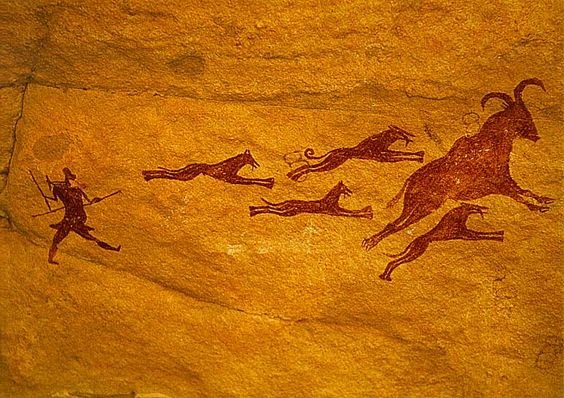| Volume 21 ● September 2018 |
 |

Cave painting of a hunt in Tassili n'Ajjer, Algeria |
Volume 21 - September 2018
What is Food?
We are eagerly preparing for NeuroSummit 6 happening in just two-and-a-half weeks! We look forward to sharing and hearing your stories, interests, fears, and excitements. Much will be shared through both structured and casual conversations and over wonderful meals. In anticipation of this gathering and the universality of ‘breaking bread’, we are thinking about food.
Food is a place. Pausing to ‘break bread’ with someone carves out a dedicated moment in space and in time, regardless of the larger circumstances. Food is the truce in the jungle.
Food is the trojan horse for the delivery of political agendas, whether as a vehicle for poison, or a trading currency, or a genuine show of love and generosity.
Food is chemistry for biological sustenance and performance. We need it to live.
Food is a relationship with our “selves”, and also with our ancestors, families, friends, environment, technology, money, and so much more.
The Psychology of Soylent and the Prison of First-world Food Choices
Essay by Lee Hutchinson - September 3, 2017
Underneath the often portrayed ideal of holding up Soylent as the ultimate meal replacement or putting traditional food up on a cultural pedestal, is a more nuanced struggle because this artificial liquid can indeed nourish our bodies. Therefore it has potential to improve lives despite its artificial nature, which creates potential for unexpected problems. Space food is in many ways very similar. If we can ultimately gain the ability to synthesize affordable, nutritious meals, why would that be a bad thing?
Technology is Ready for Synthetic Foods. Are You?
Essay by Greg Harman - December 17, 2014
There is a revulsion by many towards synthetic foods, akin to the feeling of encountering the uncanny valley. Synthetic foods tread a sensitive territory between the real and the fake, and the subject may be especially sensitive because these foods go in our bodies and are up against culturally loaded histories of conventional foods.
The Frontiers of Food Studies
Collection of essays by multiple authors - September 2011
Thinking about food is not the same as feeling it nor is it the same as eating it. But sometimes those things actually are one and the same. Fashionable diets, deeply traditional diets, governmentally endorsed diets, are always more than just about what we put in our bodies. Ask yourself, “why do I want to eat healthily?” Trying to separate the answers from social values would be difficult. So should information like nutritional guidelines go beyond just ‘nutrition’?
What Americans Can Learn from Other Food Cultures
Essay by Amy S. Choi - December 18, 2014
It is a privilege to live in one place and eat cuisine from a distant culture. Cuisines have gained the ability to truly travel the globe not much more than a century ago, riding alongside the people carrying this knowledge and craving a bit of home in a distant land. What is your comfort food?
The Joy of Food
Photographic essay by National Geographic
The cultural landscape of food represents the richest tapestry of identities. It is derived from historical events, environmental factors, traditions, obsessions, and hardship. This universality creates a rich diversity, one that can feel vulnerable with increasing globalization and technical advances in synthesized foods and manufactured meals. Maybe it is establishing yet another tier of socioeconomic status. Or perhaps the synthesized is merely adding to the diversity. |
 If Neurotransmission pleasantly tickles your neurons, please share it!
We wish you a happy and prosperous September!
If Neurotransmission pleasantly tickles your neurons, please share it!
We wish you a happy and prosperous September!
This newsletter is curated by neurotransmitters.network.
© 2018 Neurotransmitters
|
|